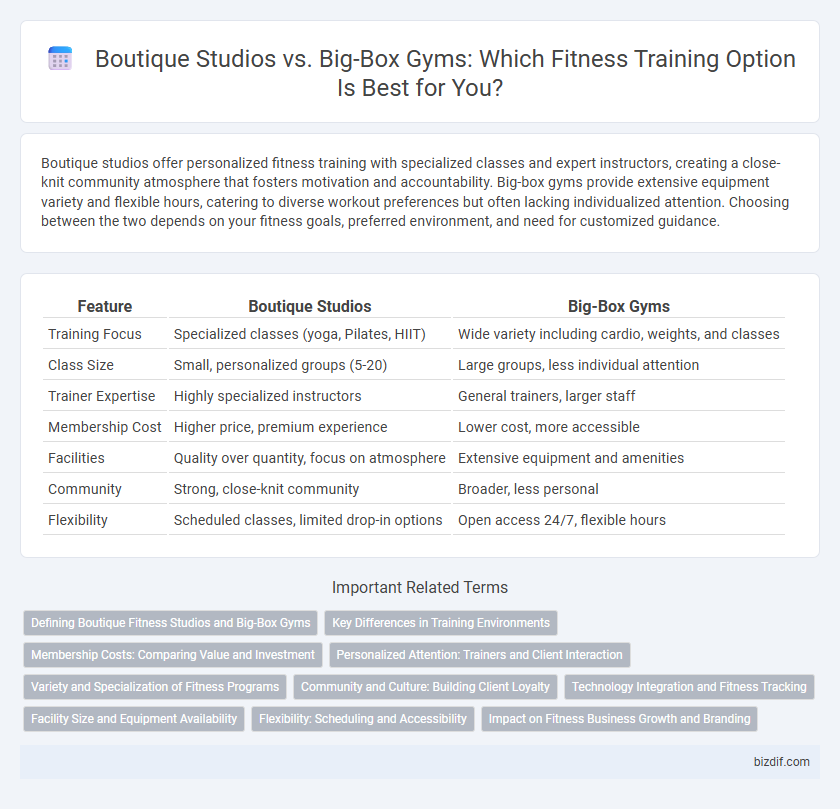Boutique studios offer personalized fitness training with specialized classes and expert instructors, creating a close-knit community atmosphere that fosters motivation and accountability. Big-box gyms provide extensive equipment variety and flexible hours, catering to diverse workout preferences but often lacking individualized attention. Choosing between the two depends on your fitness goals, preferred environment, and need for customized guidance.
Table of Comparison
| Feature | Boutique Studios | Big-Box Gyms |
|---|---|---|
| Training Focus | Specialized classes (yoga, Pilates, HIIT) | Wide variety including cardio, weights, and classes |
| Class Size | Small, personalized groups (5-20) | Large groups, less individual attention |
| Trainer Expertise | Highly specialized instructors | General trainers, larger staff |
| Membership Cost | Higher price, premium experience | Lower cost, more accessible |
| Facilities | Quality over quantity, focus on atmosphere | Extensive equipment and amenities |
| Community | Strong, close-knit community | Broader, less personal |
| Flexibility | Scheduled classes, limited drop-in options | Open access 24/7, flexible hours |
Defining Boutique Fitness Studios and Big-Box Gyms
Boutique fitness studios specialize in personalized workouts and smaller class sizes, often focusing on niche training styles such as yoga, Pilates, or high-intensity interval training (HIIT). Big-box gyms offer extensive facilities including weight machines, cardio equipment, and group classes, catering to a broad demographic with flexible access and longer hours. The contrast lies in boutique studios emphasizing community and specialized instruction, while big-box gyms prioritize scale and variety.
Key Differences in Training Environments
Boutique studios offer personalized fitness training with specialized classes and smaller group sizes, fostering a sense of community and tailored attention from expert instructors. Big-box gyms provide extensive facilities, a wide array of equipment, and diverse workout options, catering to individuals seeking variety and flexibility without the intimacy of focused support. The training environment in boutique studios emphasizes motivation and skill development, while big-box gyms prioritize comprehensive access and convenience for broader fitness goals.
Membership Costs: Comparing Value and Investment
Boutique studios typically charge higher membership fees ranging from $150 to $300 per month, reflecting personalized training, specialized classes, and smaller group sizes that cater to targeted fitness goals. Big-box gyms offer more affordable memberships averaging $30 to $70 per month, providing access to extensive equipment and varied facilities but often with less individualized attention. Evaluating the value of membership costs requires considering the investment in tailored wellness experiences versus the broader accessibility and lower price points of larger gym chains.
Personalized Attention: Trainers and Client Interaction
Boutique studios offer personalized attention with trainers who design customized workout plans and closely monitor client progress, enhancing motivation and results. Big-box gyms often struggle to provide the same level of individualized interaction due to higher member-to-trainer ratios and less dedicated supervision. Personalized coaching in boutique settings leads to improved client engagement, faster achievement of fitness goals, and tailored adjustments based on real-time feedback.
Variety and Specialization of Fitness Programs
Boutique studios offer highly specialized fitness programs tailored to specific training styles such as yoga, pilates, or high-intensity interval training (HIIT), providing personalized guidance and a focused workout environment. Big-box gyms provide a wide variety of fitness options, including multiple classes, weight training, cardio machines, and sports facilities, accommodating diverse fitness goals under one roof. The choice between boutique studios and big-box gyms depends on whether clients prioritize program specialization or a broad range of workout options.
Community and Culture: Building Client Loyalty
Boutique studios foster a close-knit community through personalized attention and specialized classes, enhancing client loyalty by creating a supportive and motivating environment. The intimate setting encourages social interaction and accountability, which big-box gyms often lack due to their size and scale. Cultivating a strong culture focused on individual goals and shared experiences helps boutique studios retain clients more effectively than larger gyms.
Technology Integration and Fitness Tracking
Boutique studios leverage advanced technology integration, offering personalized fitness tracking through wearable devices and app-based progress monitoring that caters to individual goals. Big-box gyms often provide a broader range of tech options, including virtual classes, extensive cardio machines with built-in screens, and centralized data platforms for tracking workouts across multiple locations. Both formats use fitness tracking to enhance member engagement, but boutique studios emphasize customized, real-time feedback, while big-box gyms focus on scalability and diverse technological amenities.
Facility Size and Equipment Availability
Boutique studios typically offer a more intimate training environment with specialized equipment tailored for targeted workouts, enhancing personalized fitness experiences. In contrast, big-box gyms boast expansive facilities featuring a vast array of machines, free weights, and cardio equipment, accommodating diverse training preferences and higher member capacity. Facility size directly influences equipment availability, with large gyms providing more variety, while boutique studios focus on quality and specificity.
Flexibility: Scheduling and Accessibility
Boutique studios offer highly flexible scheduling with personalized class times tailored to individual needs, enhancing accessibility for busy lifestyles. Big-box gyms provide extended hours and 24/7 access, accommodating diverse workout routines but often with less personalized session timing. The combination of tailored scheduling in boutique studios and expansive access at big-box gyms allows fitness enthusiasts to choose based on their preference for flexibility and convenience.
Impact on Fitness Business Growth and Branding
Boutique studios foster personalized fitness experiences and community engagement, driving higher client retention and premium pricing that accelerate business growth and brand differentiation. Big-box gyms leverage expansive facilities and diverse equipment, attracting a larger, more price-sensitive customer base but facing challenges in delivering personalized service. The distinct value propositions of boutique studios versus big-box gyms shape unique growth trajectories and branding strategies in the competitive fitness market.
Boutique Studios vs Big-Box Gyms Infographic

 bizdif.com
bizdif.com